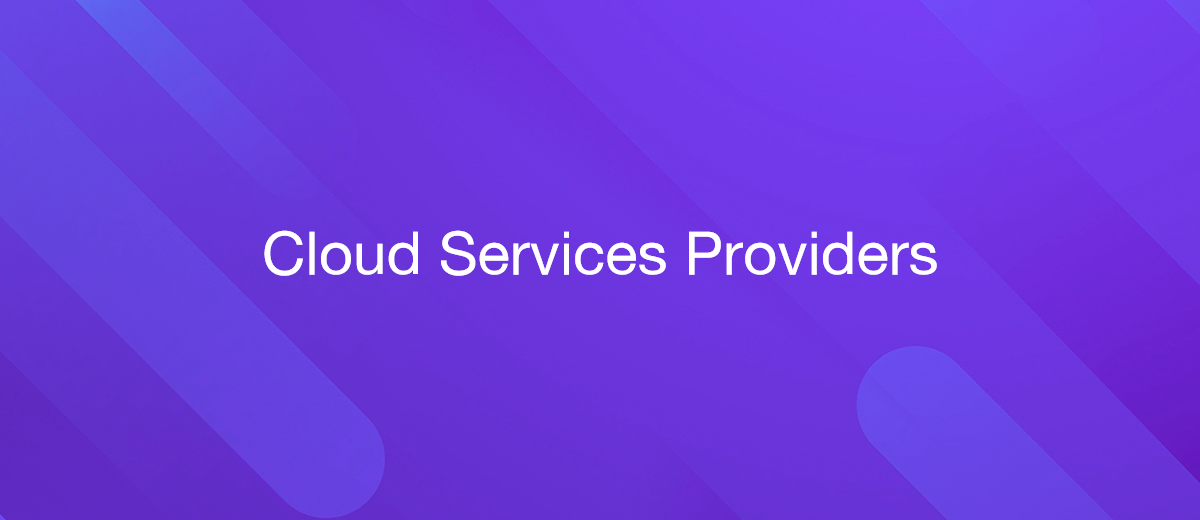5 Best Cloud Services Providers
In recent years, cloud providers have become widespread, offering rental services for servers, storage, networks, and other resources for remote data management. In this article, we will tell you how to choose a cloud service provider and which companies are considered the best in this field.
What are Cloud Service Providers
Cloud computing services are platforms that provide individual and corporate users with the computing resources they need in terms of power and volume. Modern systems of this type offer a wide range of services with flexible terms of use. Their product catalog includes physical and virtual servers, storage, databases, processors, memory modules, resources for analyzing large amounts of data, messaging, and more. Clients can choose a package of services that suits them, focusing on parameters that are important to them: power, storage and memory capacity, and a set of tools.
There are three main types of cloud computing services on the market:
- IaaS (Infrastructure as a Service). With IaaS, you can rent IT infrastructure with remote access, including storage, servers, networks, virtual machines, and operating systems. The most well-known representatives of this category are Microsoft Azure and Amazon Web Services.
- SaaS (Software as a Service). SaaS offers remote cloud access to software through subscription. Their product range includes services and applications of various types and formats. The most popular examples are Google Applications and Salesforce.
- PaaS (Platform as a Service). PaaS is similar to SaaS in general. The difference lies in the provision of additional tools, such as business intelligence services and database management systems. They are most commonly used by companies involved in software development, testing, and maintenance. The most popular PaaS platforms are Heroku and Red Hat OpenShift.
Read more in our article: SaaS, PaaS, and Other _aaS – What is It, How are They Different and Where are They Used
How to Choose a Cloud Service Provider
When choosing cloud services providers, you should pay attention to the following criteria:
- Functionality. First of all, study the set of tools offered by the provider and the terms of use for them. Make sure you get everything you need without having to search for missing features on other platforms.
- Service. In the process of selecting a cloud service, it is imperative to clarify the guarantee of service availability. Truly reliable providers provide uptime of at least 99%. Additionally, we recommend taking into account the conditions of customer support: available methods of communication, work schedule, and so on. It would be a good idea to study the parameters for maintaining and updating servers, databases, and programs.
- Scalability. Analyze the possibilities of different companies regarding increasing capacity or expanding the list of services.
- Cost and payment. Compare service plans offered by providers to find the best value for money and services included. Also inquire about the specifics of payment. The “pay-as-you-go” model is common in this area, which allows customers to pay for the volume of resources and services they consume.
Choosing a cloud service provider is not an easy task. To avoid mistakes and disappointment, we recommend preparing in advance a list of your requirements for it. Study the capabilities and functionality of each candidate, checking this list and taking into account its compliance with the criteria important to you. As a result, you will be able to choose the best option that suits you as much as possible. We suggest starting the selection with the five providers recognized as the best.
Amazon Web Services (AWS)
Amazon Web Services (AWS) is rightfully considered one of the best cloud platforms. It contains over 200 IT products. AWS includes database management systems, cloud storage, data lakes, analytics and data migration, content delivery, and edge computing tools. In addition, it has its own email provider and AWS Security system.
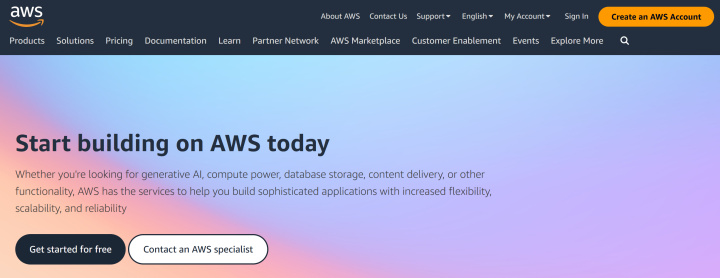
Key features:
- The performance of AWS resources is ensured by multiple data centers distributed across 105 availability zones (groups of interconnected data centers) in different regions of the world. Each region is a cluster of availability zones that are in geographic proximity to each other. They are combined into a fully redundant dedicated network with high throughput and low latency. These zones provide applications and databases in production with increased availability, resiliency, and scalability.
- One of the main services of the platform is Amazon Elastic Compute Cloud (EC2). It provides virtual servers for computing power – so-called EC2 instances. Users have access to dozens of instances of varying sizes and capacities, tailored to specific workload types, use cases, and applications.
- Amazon Simple Storage Service (S3) scalable cloud storage is a popular AWS tool. It is used for backup, data collection, and analysis.
- Amazon's relational database service supports MariaDB, MySQL, Oracle, PostgreSQL, SQL Server, and Amazon's own high-performance Aurora database. Additionally, managed NoSQL databases are available through Amazon DynamoDB. By the way, you can easily configure integrations for Amazon DynamoDB using our ApiX-Drive connector.
Amazon Web Services offers a pay-as-you-go payment model for most of its cloud computing services. Customers pay only for the services they need during the period of use, without additional licensing or long-term contracts.
Google Cloud Platform (GCP)
Google Cloud is a well-known provider of enterprise cloud solutions, and is one of the top cloud services providers. It offers a scalable IT infrastructure for businesses of various sizes and specializations. GCP provides a range of cloud computing tools, storage, databases, AI and machine learning, security, and more. The platform allows access to server and serverless computing, multi-cloud and hybrid technologies, data analytics, containers, the Internet of Things and other promising areas.
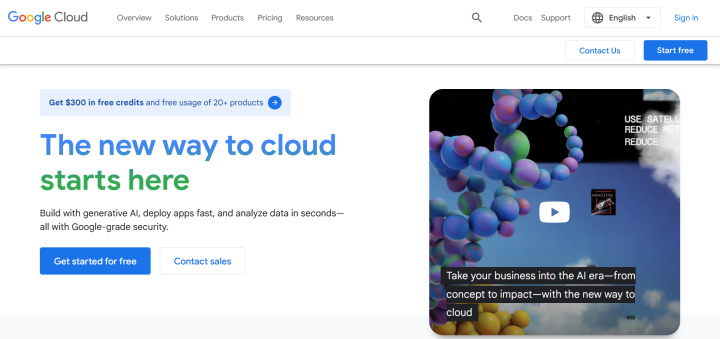
Key features:
- Google Cloud Platform has 103 availability zones in 34 geographic regions around the world.
- The platform offers two hosting options: App Engine in PaaS format and Compute Engine in IaaS format.
- Users of the system have access to two unique tools for processing and analyzing Big Data: BigQuery and Google Cloud Dataflow. The former has the ability to run SQL-like queries on terabytes of data and load them from cloud storage. The second allows you to create, monitor, and extract valuable information from the data pipeline.
- GCP hosts all of its tools and services on Google's Andromeda network virtualization stack.
- The Cloud Debugger tool allows developers to evaluate and debug code in production. They can set up a watchpoint on a line of code, retrieving all its variables and parameters every time a server request hits that line.
Google Cloud Platform operates on a pay-as-you-go model, giving new users a free $300 bonus to launch, test, and deploy their tools. All customers can use more than 20 products free of charge within the monthly limit.
Oracle Cloud Infrastructure (OCI)
When you're about to do a cloud services providers comparison, be sure to include Oracle Cloud Infrastructure (OCI). This is a hybrid platform that provides users with several types of cloud services: SaaS, PaaS, IaaS, and DaaS (Data as a Service). The main areas of its services are cloud computing, storage, and networking services. Moreover, it offers the Oracle Big Data Cloud module for processing big data, the Oracle Database Cloud Service database module, and the Oracle Autonomous Database.
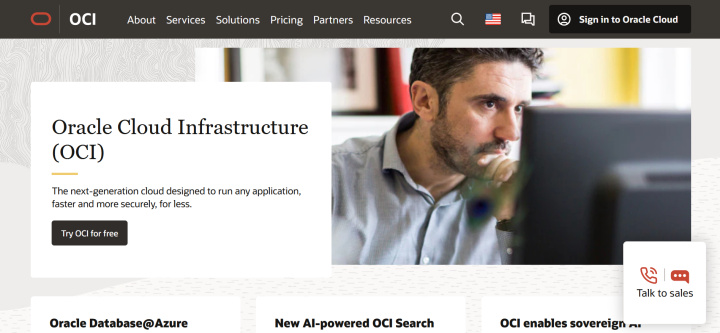
Key features:
- OCI offers users more than 100 different services. Their performance is supported by servers in 46 availability zones, which are located in 38 geographic regions around the world.
- The platform's computing tools are represented by virtual machines (VMs), physical servers, and containers. They allow companies to launch and scale any project by flexibly distributing workloads.
- Oracle Cloud Infrastructure offers different storage options: block storage, object storage, and file storage. They enable businesses to store, retrieve, and manage data efficiently and securely.
- OCI networking tools include virtual cloud networks (VCNs), load balancers, VPN connections, and DNS services. They enable businesses to create high-performance, secure network architectures.
Like other cloud service providers in our review, Oracle Cloud Infrastructure uses a pay-as-you-go payment model. You can calculate the cost of the necessary tools using the online calculator on the company’s website.
IBM Cloud
IBM Cloud is one of the most famous and in-demand providers of cloud services today. It provides users with the three most common types of tools (SaaS, PaaS, and IaaS), as well as public, private, and hybrid cloud models.
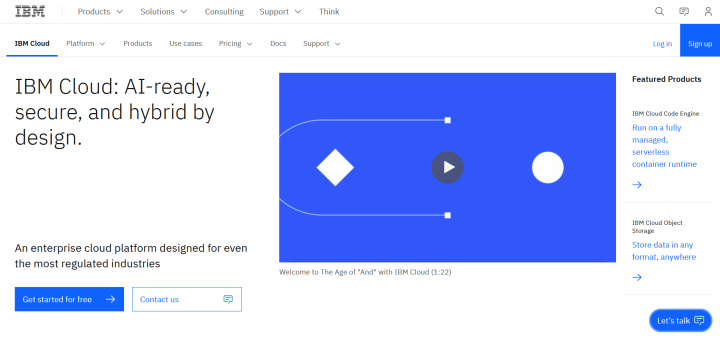
Key features:
- The platform has 18 availability zones distributed across 6 geographic regions.
- IBM Cloud PaaS allows developers to use IBM services to build, run, deploy, and manage various types of applications in a public or on-premises environment.
- AI technologies supported by the platform make it possible to develop custom artificial intelligence and machine learning models.
- IBM Cloud Pak helps automate business processes.
- The Turbonomic tool can be used as an automation tool to manage application resources and optimize costs.
- The platform has its own Kubernetes cloud service. It also provides access to the Red Hat OpenShift container registry and Istio (a server mesh for microservices).
- The system provides a range of cloud network services, including a load balancer, content delivery network, VPN tunnels, and firewalls.
IBM Cloud is considered one of the best cloud services providers not only for its solid capabilities but also for offering different payment models. Users can choose Pay-As-You-Go, Enterprise Savings Plan, IBM Cloud Reservations, and other options. The free plan gives access to 40+ services (including IBM Watson API) and bonus points worth $200. Another 350+ services are available under the pay-as-you-go (PayGo) model.
Microsoft Azure
Microsoft Azure regularly appears as one of the top cloud service providers. And this is not surprising because the platform offers users a range of cloud service formats: IaaS, PaaS, SaaS, and serverless computing. It provides tools for cloud deployment of mobile and web applications, AI, machine learning, and blockchain technologies, containers, databases, analytics, DevOps, storage, and more.
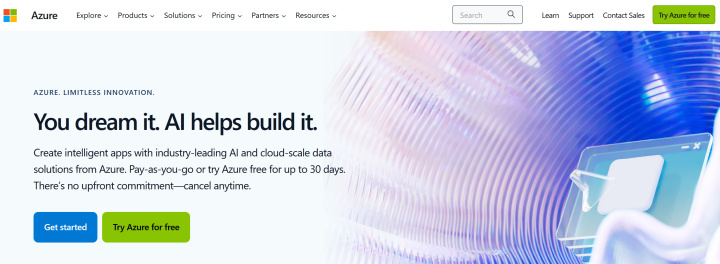
Key features:
- Azure services are supported by 116 availability zones covering 60 geographic regions.
- Azure Blob Storage allows companies to securely store and retrieve massive amounts of unstructured data, including videos, images, and documents.
- Azure SQL Database provides a managed and scalable relational database management system.
- Azure Cosmos DB offers globally distributed capabilities for processing different types of data.
- With Azure Machine Learning, companies can build, train, and deploy machine learning models to gain valuable insights from their own data.
- Azure Cognitive Services provides ready-made artificial intelligence models with speech recognition, language understanding, and computer vision.
- Microsoft Azure provides computing technologies in IaaS and PaaS formats for a variety of tasks, including publishing and managing websites.
Users can choose the Azure services they need based on their budget. Payment for them is made according to the “pay-as-you-go” model typical for such platforms.
Conclusion
There are dozens of cloud providers on the market today. The top five largest among them are Amazon Web Services, Microsoft Azure, Google Cloud, Oracle Cloud, and IBM Cloud. There are many areas of application for such platforms. The main ones include data storage, software development and testing, creation of chatbots, analysis of large data sets, data backup, and recovery.
When choosing one of the best cloud service providers, users should consider a number of important factors. In particular, you need to pay attention to the available formats (IaaS, PaaS, SaaS, and others), the number of services offered, opportunities for scaling, payment model, as well as the advantages of each of them.
Apix-Drive is a simple and efficient system connector that will help you automate routine tasks and optimize business processes. You can save time and money, direct these resources to more important purposes. Test ApiX-Drive and make sure that this tool will relieve your employees and after 5 minutes of settings your business will start working faster.
